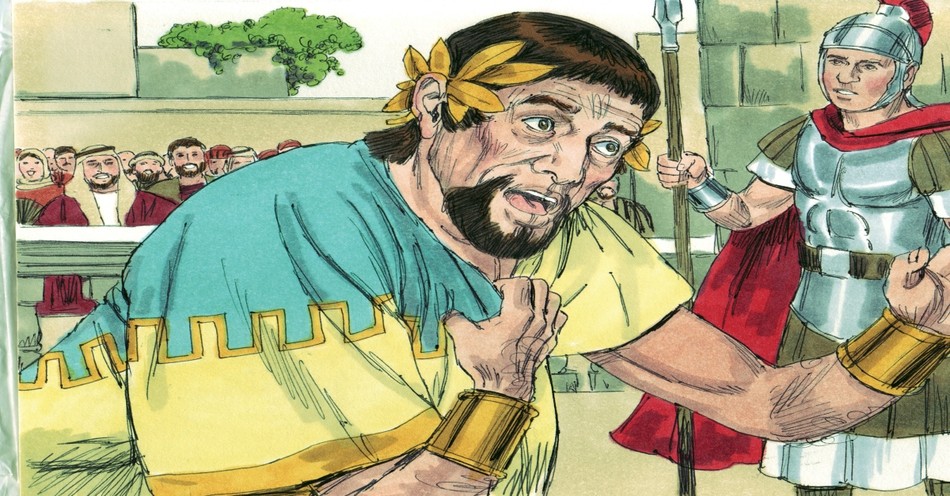The New Testament records two different kings known as Herod Agrippa. Herod Agrippa I is mentioned in Acts 12. He ruled over Judea and Samaria. Herod Agrippa II is his son. He appears in Acts 25-26.
Who Was Herod Agrippa?
Let’s begin with Herod Agrippa I, the Roman appointed king of Judea from AD 41-AD 44. The Herodian dynasty played a significant but violent part in the history of Christianity. Herod Agrippa I was the grandson of Herod the Great. In the book of Matthew, Herod the Great, intent on killing the infant Christ, slaughtered all male children two and under near Bethlehem. An uncle of Herod Agrippa I, Herod Antipas, beheaded John the Baptist and had Jesus sent back to Pilate (Matthew 14, Mark 6, Luke 23).
When Herod Agrippa I became ruler, he hoped to appease the Jews and keep peace with them. Christ’s death and resurrection fractured loyalties and overturned traditional systems. To placate Jewish leaders intent on stomping Christianity’s spread, he executed James and put Peter into prison.
Most of what we know of Herod Agrippa I from Scripture is detailed in the bookend verses of Acts 12.
“About that time Herod the king laid violent hands on some who belonged to the church.” (Acts 12:1 ESV)
His grisly death at the end of the chapter describes him as being eaten by worms (Acts 12:21-24).
“Immediately an angel of the Lord struck him down, because he did not give God the glory, and he was eaten by worms and breathed his last.” (Acts 12:23 ESV)
This dramatic and sudden end heralded into power Herod Agrippa II, the last of the Herodians.
Herod Agrippa II was king from AD 48-AD 100. Out of consideration for Paul’s Roman citizenship, he was the King who listened to Paul’s defense of the gospel and appeal for salvation (Acts 25-26).
What Does the Bible Tell Us about Herod Agrippa?
The Bible tells us that Herod Agrippa I persecuted Christians. He killed James, one of Jesus’ disciples and brother of John. James’ death pleased the Jewish people, “and when he saw that it pleased the Jews, he proceeded to arrest Peter also” (Acts 12:3 ESV).
From the Biblical account, we see Agrippa I was a man in power who sought the approval and popularity of the society he ruled. Since his action boosted his popularity among the Jews, he decided to take it a step further. He threw Peter into prison too and bound him with chains. This happened during the days of Unleavened Bread following the Passover. Herod intended to conclude his sentencing of Peter after those seven days ended.
But the king didn’t count on or know the power of a community of believers in prayer. Scripture says the church prayed earnestly for Peter, and on the very night Herod was going to bring him out, presumably for his execution, God intervened. An angel of the Lord rescued Peter.
Led out into the city and left on the streets in the night, Peter, at first unsure if it was a dream, recognized the reality of his escape. “Now I am sure that the Lord has sent his angel and rescued me from the hand of Herod and from all that the Jewish people were expecting.” (Acts 12:11 ESV)
The next day Herod Agrippa I searched for Peter but couldn’t find him. Four squads of soldiers guarding him didn’t know where he went. According to the Roman practice for losing prisoners, Herod Agrippa I killed the guards who had been watching Peter.
Acts portrays this king as fueled by people’s admiration, arrogant to the point of fanaticism. Dressed in royal attire and seated on his throne, he addressed a massive crowd.
“And the people were shouting, ‘The voice of a god, and not of a man!’” (Acts 12:22 ESV)
According to God’s Word, Herod brought on himself a brutal death. Rather than give God the glory, he took it for himself. In consequence of such blasphemy, an angel of the Lord struck him. He was eaten by worms and died.
The Biblical account of Herod Agrippa II appears in Acts 25-26. Paul had become somewhat of a political pawn between the governor of Caesarea, Festus, and the Jewish high priest and leaders. By way of a visit to the governor, Herod Agrippa II and his wife Bernice entered the debate.
King Agrippa II was enthusiastic to hear from Paul after hearing about him. The apostle was every bit as eager to speak to Herod Agrippa. With Paul’s extraordinary oratory ability, he laid out his testimony of faith in Jesus and his personal defense.
The famous words of Agrippa and Paul’s boldness are striking. “Then Agrippa said unto Paul, Almost thou persuadest me to be a Christian. And Paul said, I would to God, that not only thou, but also all that hear me this day, were both almost, and altogether such as I am, except these bonds.” (Acts 26:28-29 KJV)
What Can We Learn from Herod Agrippa?
1. No power is greater than God.
Although both King Herod Agrippa I and King Herod Agrippa II had great world influence, neither commanded history. God is sovereign, and He ultimately reigns over every human leader, evil or good.
“But God is the Judge: He puts down one, And exalts another.” (Psalm 75:7 NKJV)
“For there is no authority except from God, and those that exist have been instituted by God.” (Romans 13:1 ESV)
“For the Lord is a great God, and a great King above all gods.” (Psalm 95:3 ESV)
2. Seeking to please people more than wanting to please God is wrong.
Both Agrippas were guilty of looking for peoples’ favor even when it meant doing what was against God. How easily we fall into the same kind of trap. Popularity, notoriety, followers, likes, and successes defined by the world tempt us on a path that leads us from focusing first on Christ.
Paul must have seen this relatable struggle in himself and others when he wrote these words, “For am I now seeking the approval of man, or of God? Or am I trying to please man? If I were still trying to please man, I would not be a servant of Christ” (Galatians 1:10 ESV).
Other Biblical examples of persons who sought people’s pleasure over God instruct us not to do the same. Old Testament kings often were guilty of pacifying their diverse kingdoms by adopting other gods into their territories. Peter feared the people when he denied Christ. Influenced by the crowd, Pilate chose to release Barabbas and delivered Jesus to be crucified. Even the chief priests in the New Testament acted on the turbulent waves of public opinion.
Jesus Christ sought to please God. As Messiah, Jesus did not fulfill all the political and military expectations people sought or expected. Their refusal of His Authority proved they did not truly seek God.
“For they loved the glory that comes from man more than the glory that comes from God.” (John 12:43 ESV)
“How can you believe, when you receive glory from one another and do not seek the glory that comes from the only God?” (John 5:44 ESV)
3. The gospel of Jesus Christ must be proclaimed boldly regardless of persecution or rejection.
Herod Agrippa I and Herod Agrippa II both had the opportunity to believe but rejected the truth. Persecution from the Agrippas could not squelch the message from spreading. God placed the Herods into the story of His church. Despite unbelieving rulers, believers boldly carried the message of Jesus to those who had never heard. In fact, persecution took the gospel to places where believers had never existed before.
4. Be prepared to proclaim Christ.
Paul was ready when the opportunity arose. He knew how to get to the heart of why Jesus came and for what purpose. In his persuasive speech to Agrippa II, one short sentence clearly proclaims Jesus.
“that the Christ would suffer, that He would be the first to rise from the dead, and would proclaim light to the Jewish people and to the Gentiles.” (Acts 26:23 NKJV)
This was the gospel in a nutshell for them to contemplate. This remains our message to the world.
5. God is still King today.
The title “Herod” meant “heroic.” The Herodian dynasty in the New Testament played a cruel part in the new church’s history, yet it taught us this truth: no ruler exists outside an Almighty God’s control. He used King Herod Agrippa I and King Herod Agrippa II, even though they refused to submit to His Authority.
The Psalmist proclaims, “For God is the King of all the earth…” (47:7 NIV) “God reigns over the nations; God is seated on his holy throne.” (47:8 NIV) “…for the kings of the earth belong to God…” (47:9 NIV)
“To the King of ages, immortal, invisible, the only God, be honor and glory forever and ever. Amen.” (1 Timothy 1:17 ESV)
A look at the kings of history reminds us God is Sovereign. Herod Agrippa I and Herod Agrippa II confirm no matter how great one is in this life, there is One much greater. This day, as we go about our lives, we can be encouraged to know our loving Father reigns. The only God. Above all.
Photo Credit: Getty Images/BibleArtLibrary

Her love for pasta and all things Italian stems from years of ministry abroad. She’d love to tell you about it over a steaming cup of cappuccino. Connect with Sylvia on her blog, When the House is Quiet, her Facebook page, or Twitter.
This article is part of our People of Christianity catalog that features the stories, meaning, and significance of well-known people from the Bible and history. Here are some of the most popular articles for knowing important figures in Christianity:
How Did the Apostle Paul Die?
Who are the Nicolaitans in Revelation?
Who Was Deborah in the Bible?
Who Was Moses in the Bible?
King Solomon's Story in the Bible
Who Was Lot's Wife in the Bible?
Who Was Jezebel in the Bible?
Who Was the Prodigal Son?




